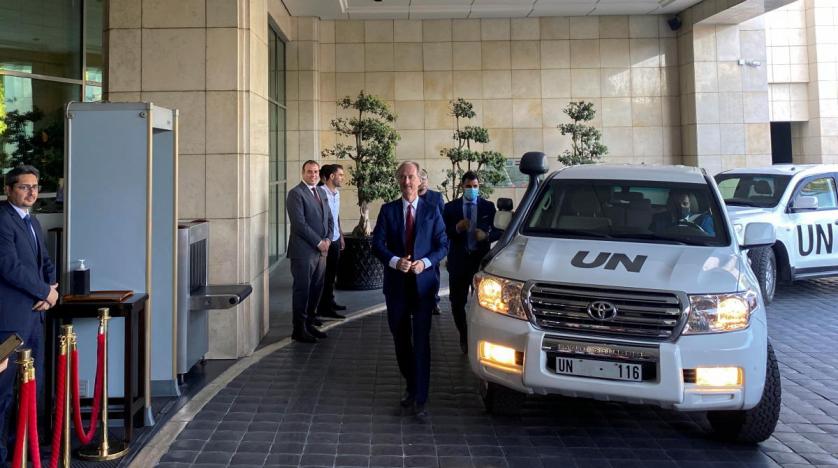The envoys of Russian President Vladimir Putin and U.S. President Joe Biden are expected to meet in Geneva on Wednesday, which will likely outline the shape of Russian-American understandings on Syria for the coming period. Moscow has succeeded in reaping political concessions, albeit symbolic ones, from Damascus, and imposing “a military status quo” on the ground in wake of the Daraa settlement and recent escalation in Idleb.
These elements will be on the table when the Russian envoy meets his American counterpart, with Moscow demanding a “political price” for its efforts.
On Damascus’ end, the “political concession” was its agreement to receive United Nations envoy Geir Pedersen after nearly two months of putting off his visit. The meeting was held after Russia directly intervened and after Iran “advised” Syrian officials to agree to it.
The second breakthrough was the agreement of the head of the government delegation to the Constitutional Committee to kick off the UN-proposed efforts to “draft” the new constitution. The sixth round of committee talks will be held in Geneva on October 6th.
Damascus had previously said it was upset with Pedersen for agreeing to meet with a Daraa delegation while negotiations were still ongoing between local committees and the regime to avert military escalation. It was also upset with his failure to discuss a regime proposal at the Constitutional Committee. These two factors, however, were forgotten once Russia “advised” Damascus to receive Pedersen.
In return, however, Damascus received UN “silence” over the statement its foreign ministry had issued in wake of the envoy’s meeting. The statement said the talks focused on the “actual developments on the ground in Daraa and the Syrian state’s satisfaction with the solutions that were reached.” It also spoke of “pressuring” the UN to declare a clearer stance on the “unilateral sanctions”, the “Turkish and American occupations”, and “foreign interference.”
Read Also: UN Envoy Hopeful Syria Constitution Talks will Resume
As for the new military facts on the ground, they were represented with the regime’s return to Daraa, “the cradle of the revolution”, for the first time in ten years. A western official said this was possible after Russia, the U.S., and Jordan – the parties of the 2018 deal on southern Syria – sponsored the completion of the implementation of the agreement, which calls for the regime’s full return to the region and easing Iran’s influence there.
With calm returning to Daraa, Russia began to escalate its military actions in the northwestern opposition-held Idleb province. This coincided with Russian Foreign Minister Sergei Lavrov declaring that Turkey had “failed to meet its commitments” in northwestern Syria. This was followed by Russian jet strikes on southern Idleb. Turkish Defense Minister Hulusi Akar responded by saying that it was Russia that had failed to meet its promises.
Of course, Moscow is eying in Idleb the reopening of the Aleppo-Latakia highway. It wants the ceasefire to hold, stop the military operations there and root out the extremists. As long as Russia and Turkey are deploying joint patrols in the region, then these goals will likely be met and the ground will be paved for new understandings between them. Perhaps the reopening of the Aleppo-Latakia highway could be exchanged for a Turkish incursion against the Kurds in the region east of the Euphrates.
Ultimately, the Russian escalation in Idleb is aimed at extracting American offers against the Hayat Tahrir al-Sham extremist group that Washington has blacklisted as terrorist.
All these issues and more will be discussed in Geneva between Russian envoy Alexander Lavrentiev and American envoy Brett McGurk. All signals point to Washington leaning towards adopting the Russian reading of the situation in Syria. McGurk’s primary concern would be seeking an alliance of parties seeking to combat terrorism and preventing the resurgence of ISIS, especially in wake of the U.S. pullout from Afghanistan.
He will likely encourage arrangements between Damascus and Qamishli, with Moscow’s guarantees, reduce Turkey’s interest in the region east of the Euphrates and offer incentives to the Russians about funding Syria’s early recovery, providing exemptions from the Caesar Act and fighting terrorism.
The Syrian Observer has not verified the content of this story. Responsibility for the information and views set out in this article lies entirely with the author.


